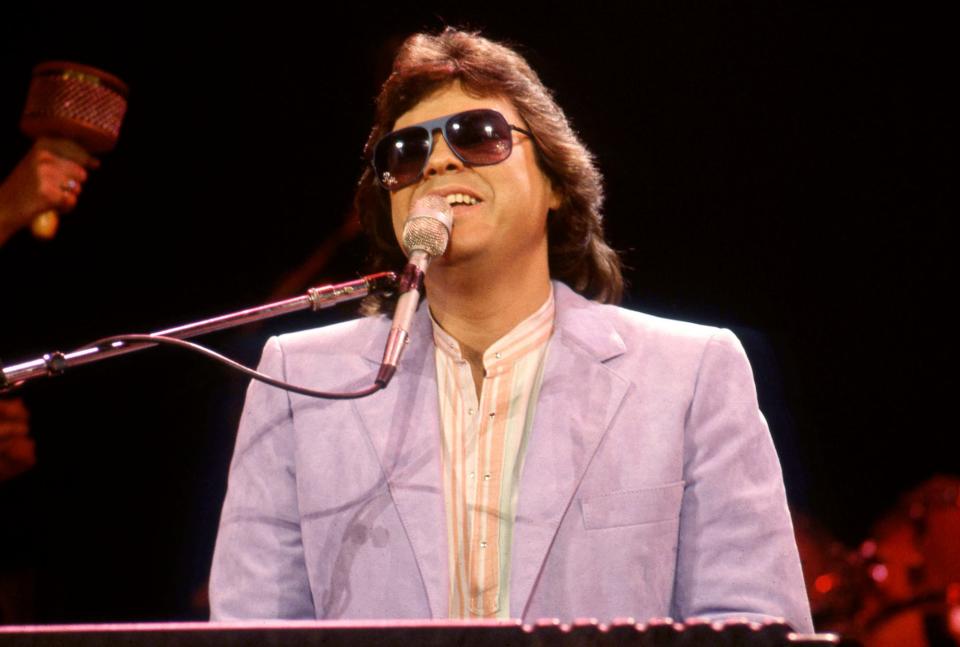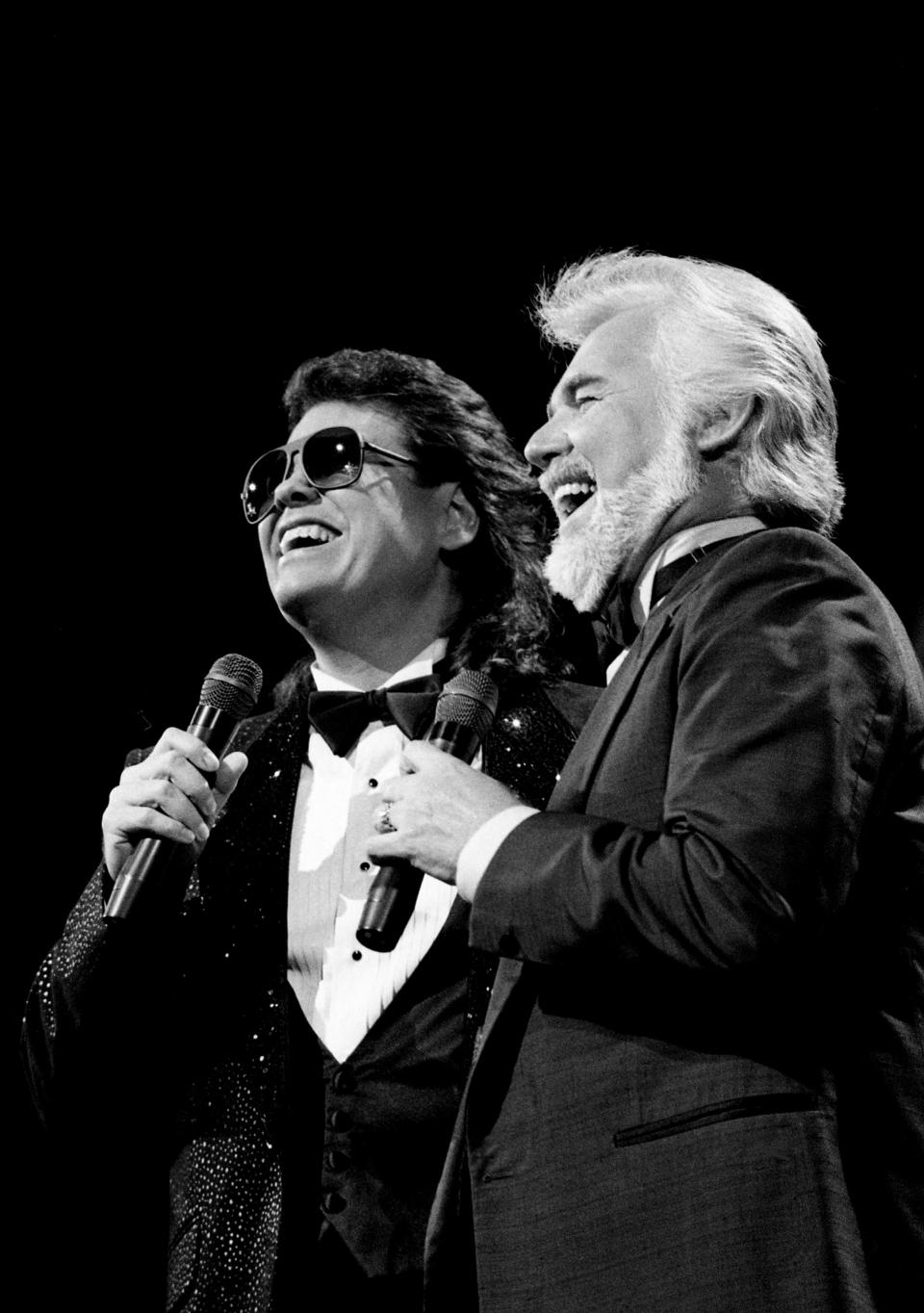How Ronnie Milsap's 'Final Nashville Show' will honor his 'heartfelt, soulful' country career
- Oops!Something went wrong.Please try again later.
- Oops!Something went wrong.Please try again later.
Because actualizing his greatness required music industry evolution, Ronnie Milsap — though a 2014 Country Music Hall of Fame inductee and Grand Ole Opry member with four Male Vocalist of the Year trophies — is perhaps underrated.
On Oct. 3 at Lower Broadway's Bridgestone Arena, an all-star lineup including Kelly Clarkson, Little Big Town, Parker McCollum, Justin Moore, Scotty McCreery, Sara Evans, Breland, The Band of Heathens, Charlie McCoy, Tracy Lawrence, Randy Houser, Lorrie Morgan, Neal McCoy, Terri Clark, Phil Vassar and more will honor the 42-time chart-topper at an event billed as the blind, 80-year-old performer's "Final Nashville Show."
Southern-born soul singers have always been able to double as country vocalists. However, the soul performers who eventually become country superstars are so astonishingly talented that their work supersedes an accurate definition of its acclaim within country music.

Milsap began an in-depth conversation with The Tennessean by calling the Oct. 3 event a "most wonderful thing."
The vocalist known for songs including "There's No Gettin' Over Me" is a master of song delivery and pure entertainment.
A 'fresh, new' and 'thunderous' sound
Milsap's career before reaching Nashville in 1973 is a testament to how Southern cities outside Nashville's machine fostered art made by soulful voices.
Before that point, Milsap was unquestionably already a star. Ask the songwriting team of Nick Ashford and Valerie Simpson, or performers Ray Charles, Elvis Presley, Roger Miller, Dottie West or Stevie Wonder about who was one of the most entertaining pianists and singers coming out of the South between 1963 and 1973.
MIlsap was the answer.
1965 saw Charles playing a gig with Milsap and complimenting his work on his Ashford and Simpson-written R&B single "Never Had It So Good" and its B-side track "Let's Go Get Stoned."
Charles loved the B-side so much that he cut it a year later.
Presley became enamored with Milsap's "thunderous" piano playing, as he was a frequent in-studio contributor to his immediate post-1968 "Comeback Special" work.
Story Behind the Song: Ronnie Milsap's 'What Goes On When the Sun Goes Down'
Forever a fan of "fresh, new" music since being a fan of early, keys-striking rockers like Jerry Lee Lewis and Little Richard, his career benefitted from other Memphis-to-Nashville expatriates of the end of that city's dominance of soul music like steel guitarist John Hughey ending up in RCA Records' Music Row studio system alongside outlaw-style songwriters like Mickey Newbury influencing the scene, overall.
Milsap's unique style was also built from spending time around a who's who of R&B at Atlanta's preeminent Black venue, the Royal Peacock Lounge, plus working with songwriters and arrangers familiar with Muscle Shoals' Swampers, including Dan Penn (Aretha Franklin's "Do Right Woman, Do Right Man," Janis Joplin's "A Woman Left Lonely").
A hit-making, expectation-changing, genre-evolving decade
For over a decade, Milsap's work alongside the trio of producer Tom Collins and songwriters Kye Fleming and Dennis Morgan evolved country music's initial foray into a more cosmopolitan, soulful style.
"Memphis and Muscle Shoals soul songs are some of the greatest all-time cuts of any genre," said Millsap of Collins' ability to mine R&B's sounds and styles and merge them into country.
Milsap's demo cuts and early Nashville studio work (including 1973's "I Hate You") were top-10 hits. Eventually, he gained the favor of Nashville executives like RCA's Joe Galante. Between 1974 and 1991, four out of every five Milsap releases was a chart-topping country single.
In 1980, his release "Smoky Mountain Rain" was among those No. 1 hits.
That song's tale of a Los Angeles-to-Knoxville love affair is so beloved that in 2010, it became Tennessee's eighth state song and four years later, Rolling Stone magazine ranked it as one of the 100 greatest country songs ever.
"It's a hit. Just like when I play (1980-released) 'Almost Like A Song,' all you have to do is play those signature first few notes and people know what's coming," Milsap said.
"Smoky Mountain Rain" joins with "There's No Gettin' Over Me," "I Wouldn't Have Missed It for the World," "Any Day Now" and "Stranger in My House" as a quintet of hits for Milsap between 1980-1985 that, alongside the accomplishments of artists including Kenny Rogers and Conway Twitty, greatly expanded country music's mainstream reach and crossover potential.

When songs like "There's No Gettin' Over Me" were next to cuts like Lionel Richie's "Endless Love" on Billboard's all-genre Hot 100 and Adult Contemporary charts, Milsap knew his national acclaim had reached dizzying heights.
'Amazing things happen'
Forever a rock n' roller seeking "fresh, new" sounds, he cited the power of Bob Seger's "Night Moves" and "Stranger in Town" albums as fleshing out country's soulful expansion during the era.
"Once I got comfortable here, I took all of my connections and influences and started changing Nashville," said Millsap, laughing.
He described 1983's "Stranger In My House" as a "bittersweet R&B love song with Led Zeppelin guitars."
Overall, Milsap's reflection on his career highlights that soul music's heart-borne authenticity forever connects it to country music.
Milsap said he's particularly fond of the work that artists like Kelly Clarkson have done to continue country music's soulful pop expansions.
"When good singers sing great songs, amazing things happen," he said.
This article originally appeared on Nashville Tennessean: Ronnie Milsap opens up ahead of all-star 'Final Nashville Show'

